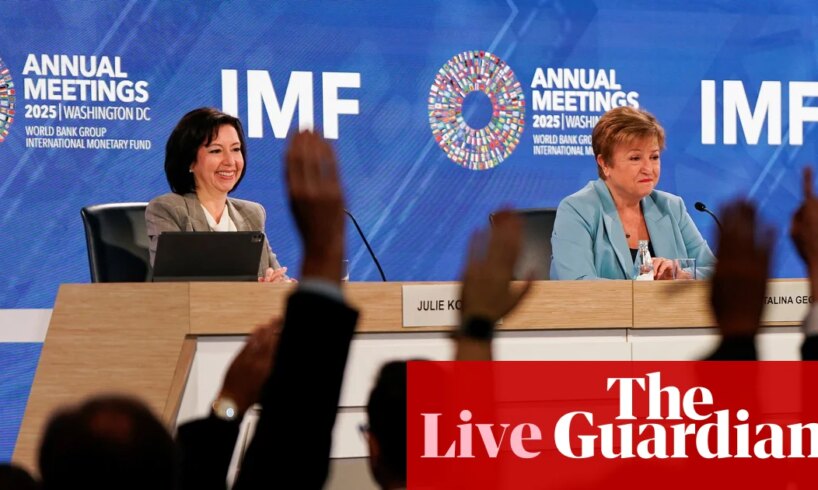
IMF’s Georgieva: Situation is better then feared, but worse than needed
In the halls of the IMF’s headquarters, managing director Kristalina Georgieva is holding a briefing with the press now.
Georgieva begins by reminding journalists that when policymakers gathered in Washington DC six months ago there was “a lot of anxiety about the state of the global economy”.
Then, the IMF was forecasting a sharp slowdown (but not a recession).
Six months on where do we stand?
“Better then feared, but worse than needed,” Georgieva says.
“Uncertainty has continued to go up, up, up” she warns, pointing towards the ceiling to emphasise the point.
But despite this, global growth has held “fairly steady”. Growth is projected to slow from 3.3% last year to 3.2% this year and 3.1% in 2026.
Georgieva says:
“That’s better than we feared, and better than we projected six months ago.”
She says there are two reasons.
First, “improved policy fundamentals”. Since the financial crisis, many economies especially emerging markets have pursued sound policies, and strengthened their institutions and frameworks, Georgieva explains. “This investment is paying off – and if I may say, stay the course.
Seconly, the private sector has shown “quite remarkable” agility in coping with challenges, such as in supply chain flexibility and front-loading imports to protect themselves from trade wars.
Overall, Georgieva cautions that “the outlook is underwhelming”. Medium-term growth prospect remain weak, public debt near record highs and continues to climb, and the global economy is excessively imbalanced, she explains.
Share
Key events
Show key events only
Please turn on JavaScript to use this feature
Asked about the situation in Senegal, Kristalina Georgieva says she gives “full credit” to the Senegalise authorities for recognising that government debt levels had been misreported (by billions of dollars)
“Debt was hidden, and they bought it to light,” she explains.
Georgieva adds that she had a very constructive discussion with Senegal at the IMF, and is pleased that there is now clarity about the issue.
Share
Georgieva: China has reached a fork in the road
Asked about China’s economy, Kristalina Georgieva says China is still expected to grow faster than the global average.
She then says China faces “a fork in the road” – whether to continue with its old, export-oriented growth model, or focus to a more domestic-consumption driven economy.
That means China must do three things
Resolve problems in its real estate sector, which are hurting consumer confidence
increase social safety nets, by redirecting money being used to subsidise industry
open up markets that are less-open today, such as services, education and healthcare
Share
Georgieva: US, France, Italy, and Japan must tackle fiscal consolidation
Q: How does the IMF view the fiscal health of the G7? And how about Canada specifically?
IMF managing director Kristalina Georgieva says the build-up of debt is being driven primarily by advanced economies, and by emerging markets (so not low-income countries as it’s hard for them to tap more borrowing).
Some of those advanced economies have more fiscal problems than others, she says.
In one corner, we have the US, France, Italy, and Japan where there is need for fiscal consolidation, she explains, adding;
“The good news is that they all recognise this need.”
[however, France for example has faced massive political challenges in doing this…]
On the other side, there are countries who are in a better position – Germany and Canada. says Georgieva, adding:
“Both Germany and Canada recognise that in this very testing time they need to use their fiscal space.”
She says that in the case of Germany, this extra spending is beneficial for Germany and the E union and the rest of the world.
She also says the IMF very much welcomes the changes Canada is making, followinng the changes in their relationship with the US, including modernising the budget framework to split operating expenditive from investment.
[Alas, Georgieva doesn’t say which bucket the UK falls into….]
Share
Kristalina Georgieva then asks those at today’s press briefing who use AI tools to raise their hands – and most of the attendees do!
Photograph: IMFShare
Updated at 14.27 CEST
Georgieva: Countries must act fast to prepare for AI
IMF managing director Kristalina Georgieva is now taking questions:
Q: How big a role is the AI investment boom playing in the resilience of the global economy?
“Excellent question”, replies Georgieva approvingly. She says the AI investment boom is bringing “incredibly optimism”, mainly concentrated in the US.
Bu, she says, there are two things AI needs to work.
First: energy, where AI’s demand is equivalent of half the energy consumption of the US.
Second: How will AI transform the rest of the economy? It will only be valuable if it makes a major contribution to productivity and growth, Georgieva says.
She adds:
We have done our assessment. Or view at this point is that AI will indeed contribute to growth, somewhere beween 0.1% and 0.8%
This is significant, Georgieva insists, as global growth is currently stuck at around 3%. If AI can contribute that extra growth it would be “very significant for the world”.
But… the IMF is urging members to prepare for this AI revolution.
Georgieva warns:
The risk we see is that we may end up in a world where there is increased productivity, but it is also a source of divergence within countries and across countries.
Preparedness really matters. It is happening fast, so we don’t really have much time as societies to be ready for AI.
Share
Georgieva: China should boost domestic demand, US should cut its deficit.
IMF chief Kristalina Georgieva then explains that the main priority is to guard against financial instability.
She says that countries with excessive surpluses like China should boost domestic demand, including by spending less on industrial policy and more on social safety nets.
At the other end of the ledger, countries with excessive deficits such as the US need to reduce fiscal deficits and incentivize private savings.
Share
People are anxious, they are taking to the streets to demand better opportunities, IMF chief Kristalina Georgieva points out.
She says the IMF is urging its members to keep trade as an engine of growth.
Share
IMF’s Georgieva: Situation is better then feared, but worse than needed
In the halls of the IMF’s headquarters, managing director Kristalina Georgieva is holding a briefing with the press now.
Georgieva begins by reminding journalists that when policymakers gathered in Washington DC six months ago there was “a lot of anxiety about the state of the global economy”.
Then, the IMF was forecasting a sharp slowdown (but not a recession).
Six months on where do we stand?
“Better then feared, but worse than needed,” Georgieva says.
“Uncertainty has continued to go up, up, up” she warns, pointing towards the ceiling to emphasise the point.
But despite this, global growth has held “fairly steady”. Growth is projected to slow from 3.3% last year to 3.2% this year and 3.1% in 2026.
Georgieva says:
“That’s better than we feared, and better than we projected six months ago.”
She says there are two reasons.
First, “improved policy fundamentals”. Since the financial crisis, many economies especially emerging markets have pursued sound policies, and strengthened their institutions and frameworks, Georgieva explains. “This investment is paying off – and if I may say, stay the course.
Seconly, the private sector has shown “quite remarkable” agility in coping with challenges, such as in supply chain flexibility and front-loading imports to protect themselves from trade wars.
Overall, Georgieva cautions that “the outlook is underwhelming”. Medium-term growth prospect remain weak, public debt near record highs and continues to climb, and the global economy is excessively imbalanced, she explains.
Share
Reeves: I’d like more budget headroom, but there are trade-offs
Heather Stewart
The chancellor then confirmed that she would like to use the budget to build up more headroom against her fiscal rules – but stressed that this would be difficult, because it requires higher taxes or deeper spending cuts.
She told UK journalists in Washington, D.C.:
“If you’re asking me would I like more headroom, of course I would, but that comes with trade-offs.”
Pointing to jittery bond markets, she said, “a greater buffer against that volatility would be helpful.”
[Reminder, we reported last week that the chancellor was looking for extra headroom in the budget, to provide a larger cushion to keep within her fiscal rules]
Share
Updated at 13.46 CEST
Reeves: Want to ensure Britain is a great place to do business
Reeves was also asked whether she would levy new taxes on banks in the budget.
In reply, she stressed the importance of maintaining a competitive environment, saying:
“We want to make sure that Britain is a great place to do business and to bring in business. Financial services is one of our success stories in the UK.”
Confronted with research from UK Finance suggesting UK banks are already more heavily taxed than their rivals, she did not demur.
Share
Source





